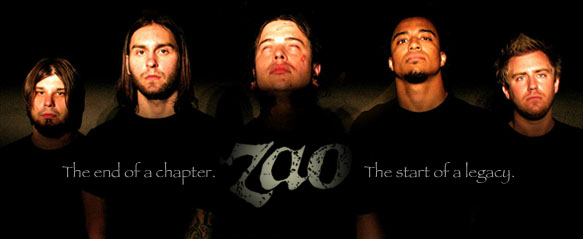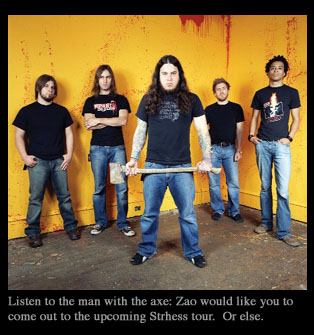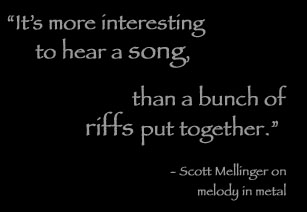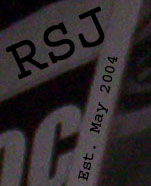|

Zao takes its name from the Greek word meaning alive. Given the number of times this band's been reborn, there may not be
a more accurate association. Constant member changes, touring difficulties, the Christian metal stigma -- all have held Zao
back, as they've watched countless imitators find greater success in the ever growing metalcore scene. But things may be
changing. With the band's latest release selling faster than all previous work, Zao hopes "The Funeral Of God"
will signal the death of internal strife and instability. Guitarist Scott Mellinger is ready to face the future as the band
heads out for next month's Strehess tour with Bleeding Through.
Rock Star Journalism: Prior to recording your latest album, the last original member left the band. How do you think Zao
operates differently now?
Scott Mellinger: The only thing that's changed is the fact that it was a lot easier for us to work together cause we all
wanted the same type of music and lived a lot closer. In reality, all the records from "Blood & Fire" on were
written by the same people, so nothing [musically] really changed.
RSJ: Do you feel that there is more of a sense of stability with the current line-up?
SM: I think there's a sense of stability between me, Russ [Cogdell] and Dan [Weyandt], and there always will be. Hopefully,
we won't lose anybody else, but if we do, I think we've stuck through it so long that if us three stay together we'll be alright.
RSJ: Now that you've been with Ferret for awhile, how would you say working with this label is different from your time
with Solid State?
SM: The label seems way more apt to help us out, be part of the team with us. When we were on Solid State, the band was
in such disrepair that I don't blame how they reacted to us. I don't think it was all Solid State's fault. But I definitely
think now, with the band being how it's been and the label being excited that it's been ten times better.
RSJ: Prior to the past year, Zao toured very sporadically. Have you found it difficult to go from that to being on the
road fairly consistently?
SM: It's hard to do it, especially since I just got married. I've been with my wife for about eight years, so it's hard
to leave. But I think we all know that all Zao really needed was to tour consistently, and we could have made something more
of it and turned it into what we're trying to turn it into now. I think all of us have that want to tour as much as we can
to get it in front of new people.
RSJ: I read that you've been trying to phase out a lot of the older songs for your recent shows. How has reaction to
that been?
SM: A lot of kids that come to see us now know the new record and are as excited about the new songs as the older songs.
There's always gonna be about four or five old songs that we'll have to play, but I think as the future comes and we do this
next record, we have to play more new songs. Cause the band is kind of at a new beginning, so we wanna play those newer songs
and get as much out of them as we can. Also, I think a lot of us in the band want to play the songs that everybody was part
of.
RSJ: I read an interview with Russ, where he said you tend to get a better reception in places like California than you
do in your hometown of Pittsburgh. Have you noticed this as well?
SM: Definitely. Things are finally starting to change a little bit, but Pittsburgh actually isn't that big of a music
scene to begin with. A lot of the clubs that we've been able to play have been shut down over time; there's maybe three clubs
left that you can even play around here. But finally, after the last year of touring, when we do play Pittsburgh we're starting
to do a lot better than in the past.
 RSJ: You're going out on a European tour shortly -- tell us about your fans and the following overseas.
SM: We're still trying to build it up over there, but the people that know who Zao is and come to see us all are extremely
excited. We started going over with this new record, and every time has been better -- it's really neat to see the difference
in crowd responses. Over there, I think people tend to like to just chill and listen to the music, versus here where they're
kind of there to flip out and do their thing to your songs.
RSJ: You've explained that "The Funeral of God" is a concept album about what would happen if God chose to disappear.
Who first brought this idea to the table?
SM: Dan -- he wanted to do a record with a central theme behind it. When he came up with this idea, it seemed like it
was gonna be a lot harder than it was, and then things just started falling into place.
RSJ: You've said this isn't a Christian-based record, that people can have their own interpretations of God. Is the Christian-metal
stigma something you're trying to move away from?
SM: I think a lot of bands that were pigeonholed into that whole Christian thing are trying to get away from it now.
When I joined the band they were trying to break free from that then. Everybody has their own beliefs and ideas in Zao, but
I think as a central idea, we don't wanna push anything on people. As far as I'm concerned, none of us "know" anything
-- I mean, we believe what we wanna believe, so there's no reason to push a belief on somebody. I think to get up on stage
and act like you know you're right is really wrong. That's really what we're trying to pull away from, this close-minded
view of what Christianity is. I think it's gotten to a point now where people see what our president does and see a lot of
what these close-minded religious bigots do, and I don't wanna be categorized with that.
RSJ: Do you think the religious aspect of your band is part of what kept you from mainstream success, given that a lot
of bands that came after you developed a similar sound, but broke through faster?
SM: I definitely think so. There's a very big Christian fanbase out there that wants to have these bands, but you've
gotta face the fact that the majority of fans that listen to metal aren't into that and aren't into having beliefs pushed
on them. I think that it hurt us cause a lot of people had a misconception of how we were as people.
RSJ: Hardcore and metal have definitely crossed over more in recent years -- do you think this will eventually lead to
radio recognition?
SM: There are a lot hardcore bands that are trying to put some singing in there and have something that a different audience
could catch on to. I think there's probably gonna be some bands that will change enough that the mass will finally accept
them. But you've got bands like Killswitch Engage and Atreyu, that are probably the biggest hardcore bands that have ever
been in record sales, and they're not even selling gold yet. I don't know if hardcore will ever have a band that does platinum.
And if it does, that would be amazing and unbelievable, but we didn't get into this thinking that it would ever get big.
What's happened in the last two years has blown my mind, just that you can make a living playing hardcore music. That was
like a dream five years ago.
RSJ: You've said that you don't feel as connected to the hardcore community as you once did. Why is that?
SM: A lot of us in the band really don't listen to this style of music. I actually listen to The Beatles and older classic
rock, and Johnny Cash is one of my favorite things of all time. So, musically, we don't feel as connected, but I think in
ideals we do. We come from a small town, where fame and fortune isn't something you'd even think you could ever have, so
we come from this punk ideal where you've just gotta go do it yourself. And I definitely still feel connected to that and
still feel connected to a community of people who aren't massively accepted.
 RSJ: You mentioned that one of your biggest inspirations is Johnny Cash. Why has his music meant so much to you?
SM: I actually started playing music through him, cause my grandfather taught me to play "Folsom Prison Blues." So, I feel
connected from a young age to that type of music, but I think what's amazing about Johnny Cash is the way his life was. The
way he's been humble -- even with his Christianity, he's not one of those Christians that push stuff down your throat. He
was just a person looking for truth and portraying truth, and I admire that so much.
RSJ: A lot of the bands you've talked about liking are more melody based. With the heavier melodies present on the new album,
were you more involved with creating the music than on previous records?
SM: Actually, no, I think it's just that I've matured in my songwriting. I've had as much to do with all the records as I
did with this one, but I think I finally found the way to write with melody, but also keep it heavy and mix it so it doesn't
sound so off. Cause there's a lot of bands that I think try to bring melody into metal and it's so disorganized -- there's
a real heavy crazy part and then the little tiny singing part. With Zao, we try to write songs, and we try to write with
a rock structure no matter what. The guitars and the drums are heavy sounding, but if you listen to the songs, you could
play them on an acoustic guitar cause the structure is written that way. I think it's more interesting to hear a song than
a bunch of riffs put together.
RSJ: You're the frontman for Jade Meridian as well. In what ways does this provide a different outlet for you than Zao?
SM: I've always loved singing. I've wanted to do a band where I was solely singing and it could be extremely pretty if it
wanted to be and still heavy if it wanted to be. With Zao, you can do so much melody, but if you write a song that sounds
like Sunny Day Real Estate, you can't use it. Stuff like that's always intrigued me, and when I write songs at home by myself,
they all come out like that. With Zao, it's cool cause you have this outlet of energy and heavy anger, but then all of us
have totally different sides of us, and we like to write for that too.
RSJ: Do you have anything available from that band, other than what's on the Pure Volume site (http://www.purevolume.com/jademeridian)?
SM: We did a little demo that sounds really bad, but me and Russ, who's in that too, are in the process of starting to record
some of those songs.
RSJ: I read that you're putting together a Zao dvd and asking fans to send in old footage. What are you looking to include
in this project?
SM: Our manager has a background in film and production, so what he wanted to do was make the official story of what really
happened in the band and why things happened and why Zao goes through 50 different people. I think what it'll be is a testament
to the struggle of an underground band. We just wanna show how all hardcore bands, not just us, go through these struggles,
member changes, cancellations, records flopping -- just to show how that works and what happens. It's gonna be really exciting,
cause I don't think anybody of our stature, that's not selling platinum records, has ever tried to do something like this.
RSJ: You'll be participating in the Warped Tour this year. Is this your first big festival tour?
SM: Yeah. Warped Tour is definitely one of those huge things that if you get a chance to do you have to do it. We did try
to do Ozzfest this year, but that fell through and Warped Tour was willing to let us get on, so we're really excited to do
it.
RSJ: What are you most looking forward to?
SM: Seeing how kids that maybe don't listen to this type of music react to us. It's kinda neat to play in front of people
you wouldn't normally play in front of, being a metal band.
RSJ: Are you concerned about anything, being that you've done this kind of tour before?
SM: You know what? We've been through so much crap, I'm not concerned about anything anymore.
Got something to say about this feature? E-mail us.


|

